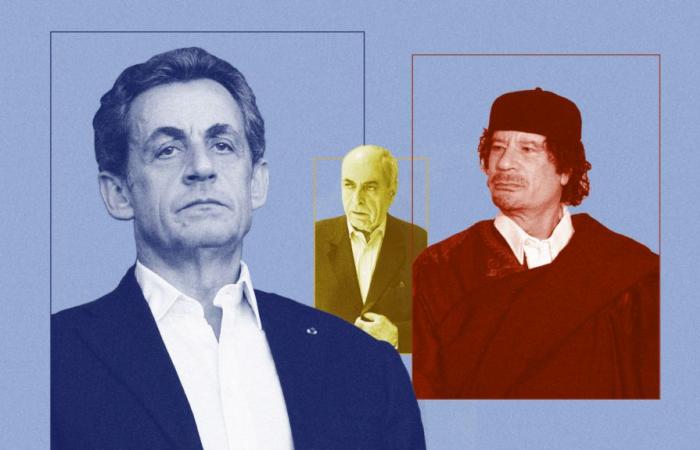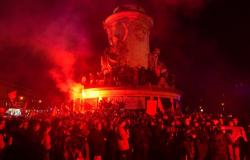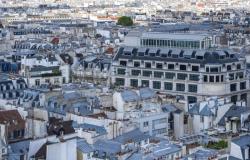At the end of 2007, while France was preparing to receive the Libyan dictator Muammar Gaddafi with great fanfare, the Secretary of State for Human Rights, Rama Yade, fumed and spoke of “kiss of death”. She doesn't think she says it that well. In March 2011, some time before his execution by rebels, Colonel Gaddafi dropped a small bomb: it was thanks to his money that Nicolas Sarkozy would have won the presidential election. Fourteen years later, the former president and 12 other defendants appear in the case of suspected Libyan financing of the campaign for the 2007 presidential election which he won.
The trial, which opens Monday January 6 before the Paris criminal court, will dissect for four months this “corruption pact” established, according to the prosecution, between the former UMP candidate and the extremely wealthy Libyan supreme guide. . At the end of ten years of investigation, the judges considered the charges sufficient to accredit this scenario worthy of a spy novel.
How did this affair break out?
The accusations launched by Muammar Gaddafi, then his son Seif al-Islam at the time of the fall of the Libyan regime in 2011, became clearer the following year. On April 28, 2012, right between the two rounds of the presidential election, Mediapart published an official Libyan document, dated December 2006. It concerns a financing agreement for Nicolas Sarkozy's campaign, in 2007, to the tune of 50 million euros. The same year, testimonies came to support this thesis. On May 3, 2012, the former Libyan Prime Minister Baghdadi al-Mahmoudi, imprisoned in Tunisia, in turn asserted, according to comments reported by his Tunisian lawyers, that Libya did finance Nicolas Sarkozy's accession to power.
In December, Franco-Lebanese businessman Ziad Takieddine drove the point home. During interrogation as part of the financial aspect of the Karachi affair – in which he was sentenced at first instance, in 2020, to five years in prison – this intermediary claims to have transported three suitcases of tickets, totaling 5 million euros, between the end of 2006 and the beginning of 2007. The recipients, according to him? Nicolas Sarkozy and Claude Guéant, his chief of staff, at the Ministry of the Interior. On April 19, 2013, the Paris prosecutor's office opened a judicial investigation against X.
Under what circumstances was the supposed “corruption pact” made?
For the prosecution, the secret pact with Muammar Gaddafi was established on October 6, 2005, in the dictator's tent in Tripoli. Officially, the visit of Nicolas Sarkozy, then Minister of the Interior, is devoted to illegal immigration. As he confided during the investigation, the French ambassador at the time, Jean-Luc Sibiude, remembers an abnormally long interview – 30 minutes, according to the AFP report published that day. Despite the judges' requests, the interpreter who translated for Nicolas Sarkozy did not want to betray his oath.
The recording of this conversation, very likely given that Muammar Gaddafi systematically recorded his meetings with his visitors, according to several testimonies collected during the investigation, has never been found. Was it destroyed during the war or stolen and kept as a bargaining chip? This is one of the gray areas of this issue.
What were the negotiated rewards, according to the prosecution?
According to the investigating judges, several considerations were negotiated within the framework of this pact. Diplomatic, first: ostracized from the international scene in the 1980s for his involvement in attacks, Muammar Gaddafi negotiated his return to the international scene. For the prosecution, his invitation to Paris in December 2007, to the great dismay of certain members of the government of the time and the families of victims of terrorism, is a way to restore his image.
At the same time, economic compensation was identified by the magistrates, with the signing of large-scale contracts between the two countries, particularly in the areas of civil nuclear power and intelligence. The French company Amesys thus provided listening and surveillance equipment to the regime.
Judicial counterparts, finally: according to the prosecution, Nicolas Sarkozy promised to lift the arrest warrant targeting Abdallah Senoussi, the head of Libyan military intelligence, sentenced to life in his absence by the French courts for his role in the attack against the DC-10 of the French company UTA, which left 170 dead, including 54 French, in September 1989. Several relatives of the victims will be civil parties to the trial. Even if this counterpart, like others, “remained in the state of promise”the judges consider that the offense of corruption is characterized.
Who are the 12 other defendants in the case?
Nicolas Sarkozy is suspected of having allowed “perfect knowledge of the facts” his relatives for recovery of the money. Four members of his close guard at the time were therefore sent back to his side, including ex-ministers Claude Guéant and Brice Hortefeux. The latter, according to the judges, “organized” and received “fund transfers” from Libya, notably via the Franco-Lebanese businessman Ziad Takieddine. Between March and July 2007, Claude Guéant visited a man-sized safe rented from BNP Paribas seven times. He is also accused of personal enrichment via a fictitious sale of two paintings, a section in which four defendants are referred.
The former treasurer of the 2007 campaign, Eric Woerth, is for his part suspected of having circulated cash within the UMP candidate's team. In his defense, he asserted that these bonuses, estimated at 250,000 euros by the prosecution, came from “anonymous donations” received by mail. A version contradicted by witnesses who spoke of the existence of a cabinet containing wads of banknotes at Nicolas Sarkozy's campaign HQ.
Alongside Ziad Takieddine appears Alexandre Djouhri, another unofficial intermediary. The two men, close to French right-wing networks, but in competition, each worked separately to channel Libyan money, before and after the election of Nicolas Sarkozy. On the Libyan side, only the regime's financier, Bachir Saleh, is referred to French justice because of his “central role”. According to the judges, it “knew the exact amounts paid to the French” et was exfiltrated to Paris after the fall of the regime, in exchange for his silence, before being sent to Niger then to South Africa. Subject to an arrest warrant, he should be tried in his absence.
What are the elements in charge and in discharge?
After Muammar Gaddafi's first accusations, seven former Libyan dignitaries attested to this “corruption pact”, even if none of them witnessed it directly. The former Minister of Oil Choukri Ghanem, found drowned in the Danube, in Vienna, in the spring of 2012, mentions for example in one of his notebooks, on April 29, 2007, three payments intended for Nicolas Sarkozy, totaling at minus 6.5 million euros. According to various testimonies collected, two financing channels were identified: cash given by the financier of the Libyan regime, Bachir Saleh, and transfers made via offshore accounts on the instructions of Abdallah Senoussi, the head of Libyan military intelligence. The investigations were thus able to highlight money transfers, including 6.5 million euros paid in three installments to an account of Ziad Takieddine, from the Public Treasury and the Libyan intelligence services, between January and November 2006.
In the defense, the magistrates were unable to determine the total amount of the sums finally handed over and recognized a lack of “irrefutable evidence”, evoking “disbursements of cash in a temporality and chronology compatible with a hidden use during the 2007 electoral campaign”. “In economic and financial matters, there is no evidence”underlined the investigating judges, who defend the method of “clue bundle”. And to concede that“no cash transfer was made to Nicolas Sarkozy” and that“no personal enrichment” of the latter has not been revealed, “contrary to what has been observed for Claude Guéant or Ziad Takieddine”.
What is the former president's line of defense?
After the publication of the incriminating document by Mediapart in 2012, Nicolas Sarkozy immediately denounced “fake rude” and filed a complaint against the investigation site. The procedure ended in a dismissal, definitive in 2019. The former President of the Republic persists in saying that this case is a “fable”. If this funding had existed “so massively”, “why is there no proof of this? Not even a beginning?” he said during an interrogation. “You haven’t found anything about me.”he added. As his lawyers pointed out to the judges during the investigation, the investigations with the providers of the 2007 campaign in the context of the Bettencourt affair – for which their client obtained a dismissal of the case – did not reveal “no anomaly”.
According to Nicolas Sarkozy's defense, the accusations of Muammar Gaddafi and then of his followers are part of a “vengeance” after the recognition by the former French president of the Libyan National Transitional Council in March 2011, then of his active role in triggering the coalition operation against the regime. “No other head of state, including those most involved in the conflict, has suffered the slightest accusation from the regime”oppose the judges, thus rejecting the thesis of a “machination” Libyan. As for the other line of defense, that of a “scam” set up by Ziad Takieddine for “make believe” to Muammar Gaddafi that Nicolas Sarkozy “requested his financial assistance” in order to “capture the allocated funds”the magistrates consider it “simply implausible”.
Why did the main accuser, Ziad Takieddine, recant for a while?
That's one of the tricks in the whole thing. On November 11, 2020, despite accusations from the Sarkozy clan targeting him, Ziad Takieddine, on the run to Lebanon, cleared Nicolas Sarkozy in the French media and accused the former investigating judge in charge of the case, Serge Tournaire, of having distorted his words. Heard in Beirut a few months later by French judges, on January 14, 2021, the versatile businessman once again incriminates the former head of state, assuring that he was offered “millions of euros” in exchange for this retraction.
Justice suspects 10 protagonists of having participated in this operation called “Save Sarkozy”. Among these people, the queen of the paparazzi Mimi Marchand and the intermediary Noël Dubus, already convicted of fraud. A judicial investigation was opened in June 2021 for witness tampering and criminal conspiracy. Nicolas Sarkozy and his wife Carla Bruni-Sarkozy were indicted in this case.
What are the legal issues in this trial?
They are heavy, especially for Nicolas Sarkozy, who arrives at the hearing with a record. His one-year prison sentence under an electronic bracelet for corruption in the Bismuth affair became final on December 18 and he must be summoned at a later date to determine the terms of his bracelet. He also received a year in prison, including six months, in the Bygmalion affair. The Court of Cassation will rule in 2025 on this conviction, which concerns his campaign expenses, but this time for the lost election of 2012. A case not without echo with the Libyan affair. “We can reasonably estimate that the excess” of 20 million euros in 2012 “also existed in 2007, but it was financed by external contributions, the main one of which could have been Libyan money”estimated the investigating judges. In the Libyan financing trial, Nicolas Sarkozy faces, like the majority of defendants, ten years in prison and a fine of 375,000 euros. The court can also deprive him of his civil rights and prohibit him from holding public office.






